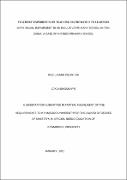| dc.description.abstract | This study aimed at finding out teachers’ experiences in teaching mathematics to learners with visual impairment in an inclusive primary school in Tanzania. The study was guided by three objectives, namely; teachers’ knowledge and skills in teaching mathematics to learners with visual impairment, the methods teachers use when teaching mathematics and challenges they face when teaching mathematics in an inclusive class.
Qualitative research approach was applied and the study design was case study. It was conducted in one primary school in Misungwi district, Tanzania which offers inclusive education. The study involved eight (8) participants who are mathematics teachers at Mitindo inclusive primary school where data for this study were collected. The data were gathered through the use of semi-structured interview and observation guides. Data were analysed `qualitatively based on research questions. The study found out that most of the ordinary teachers have no knowledge and skills on how to teach mathematics to learners with visual impairment in an inclusive class. This has been caused by the inadequacy of inclusive and special education courses offered in the colleges they studied from. The study also found out that the majority of ordinary teachers do not use tactile materials when teaching mathematics to learners with visual impairments. Furthermore, the study revealed that the methods teachers used when teaching mathematics to learners with visual impairment did not suit the needs of learners with visual impairment, which made them not to grasp well the lessons. Conclusions from the study were that teachers lacked knowledge in teach-ing mathematics to LWVI, methods were not appropriate, materials were not suitable to meet learning needs of learners with visual impairment and classes were overcrowded. The study recommended that the government under MOEST should provide teaching and learning equipment and materials like Perkins Braillers and tactile materials to improve teaching and learning to learners with visual impairment in an inclusive school. Furthermore, the government under the Ministry of Education Science and Technology (MOEST) should increase subvention grants to schools to be able to purchase materials needed when preparing instructional materials that suit the needs of all learners including LWVI in an inclusive class. Special workshops are needed to train teachers on how to make tactile materials. However the government under Ministry of Education Science and Technology should organize regular refresher courses and workshops for teachers to get knowledge on how to teach mathematics to learners with visual impairment in an inclusive school. | en_US |

